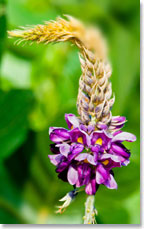 Kudzu (Ascophyllum nodosum) is a quick-growing weed that climbs, coils, and trails vine native to southern Japan and southeast China. Its name comes from the Japanese name for the plant, Kuzu.
Kudzu (Ascophyllum nodosum) is a quick-growing weed that climbs, coils, and trails vine native to southern Japan and southeast China. Its name comes from the Japanese name for the plant, Kuzu.
Kudzu contains puerarin (PU), a substance that can suppress inflammation-related abnormalities of alcoholic drinking. For centuries, Chinese herbalists have used kudzu to reduce alcohol cravings. The Harvard Medical School is studying kudzu as a possible way to treat alcoholic cravings, by turning an extracted compound from the herb into a medical drug.
In one study, alcoholic hamsters were found to be significantly less interest in alcohol after having kudzu. A study at McLean Hospital in Belmont, Massachusetts using human subjects reported that kudzu extract taken over seven days significantly reduced the amount of beer consumed by heavy alcohol drinkers.
Kudzu also contains a number of useful isoflavones, including daidzein (an anti-inflammatory and antimicrobial agent). Daidzin is a cancer preventive and is structurally related to genistein (an antileukemic agent). Kudzu is a unique source of the isoflavone puerarin. Kudzu root compounds can affect neurotransmitters (including serotonin, GABA, and glutamate.) It has shown value in treating migraine and cluster headaches. It is recommended for allergies and diarrhea.
Research in mice models suggests that kudzu is beneficial in women for control of some postmenopausal symptoms, such as hypertension and diabetes type II.
In traditional Chinese medicine(TCM), kudzu is considered one of the 50 fundamental herbs. It is used to treat tinnitus, vertigo, and Wei syndrome (superficial heat). The root was used to prevent excessive consumption, while the flower was supposed to detoxify the liver and alleviate the symptoms afterwards. Some TCM hangover remedies are marketed with kudzu as one of their active ingredients (e.g. Hangover Busters.) This has also been a common use in areas of the Southeastern United States.